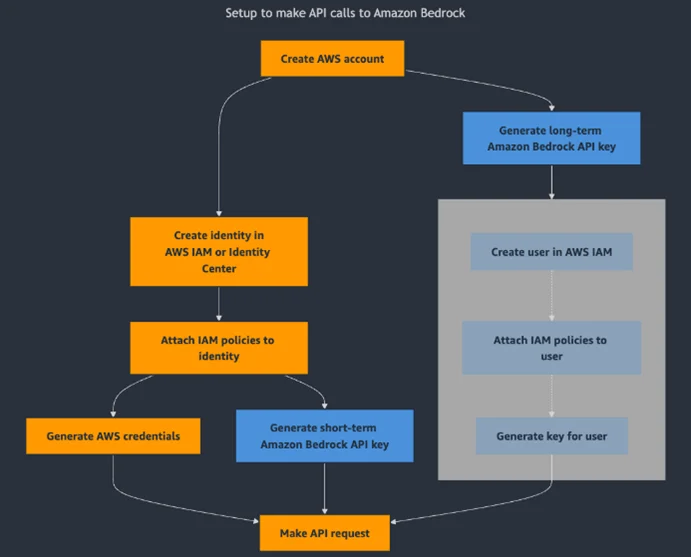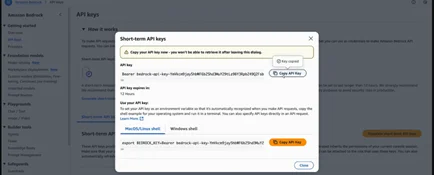|
Voiced by Amazon Polly |
Overview
Amazon Bedrock now offers API key authentication, designed to streamline access to foundation models and reduce setup complexity for developers. By enabling API key support, Amazon Bedrock simplifies model interaction, making it easier to experiment, build, and scale intelligent applications with less friction.
Pioneers in Cloud Consulting & Migration Services
- Reduced infrastructural costs
- Accelerated application deployment
Introduction
Developers building with GenAI technologies often face overhead from IAM configuration and permissions. With the launch of API key-based authentication, Amazon Bedrock addresses this challenge, offering a faster, more intuitive way to connect and build.
Introducing API keys in Amazon Bedrock doesn’t simplify authentication, it unlocks new possibilities for developers, data scientists, and enterprises building scalable GenAI applications.
- Faster Prototyping in Startups
Startups working on MVPs and proof-of-concepts often operate with limited DevOps resources. API keys remove the need to configure AWS IAM roles and complex security policies in the early stages. This allows teams to rapidly test different foundation models (like Claude, Titan, Jurassic, etc.) and easily iterate on their product ideas. - Integration with No-Code/Low-Code Tools
Many no-code or low-code platforms support bearer-token authentication. With API keys, developers can embed Bedrock-powered GenAI capabilities (e.g., summarization, sentiment analysis, content generation) directly into tools like Airtable, Retool, Bubble, or internal dashboards without needing a full-fledged backend. - Streamlining Internal AI Workflows
Internal teams often run batch jobs or experiments with foundation models in large enterprises. API keys make it easier to standardize access across teams. For example, an internal LLM-based document summarization pipeline can be triggered securely using short-term keys during CI/CD workflows without exposing long-term credentials. - Controlled Experimentation for External Partners
Organizations collaborating with third parties (e.g., consultants, academic researchers) can issue time-bound API keys for limited access. This provides granular control without onboarding them fully into AWS IAM or exposing sensitive infrastructure. - Future Vision
As API key support matures, we can expect more fine-grained policy controls, automated key rotation options, and tighter integrations with secrets managers and monitoring tools. This will position API keys as a developer-friendly option and an enterprise-ready authentication mechanism.
Ultimately, Amazon Bedrock API keys represent a step toward democratizing GenAI access, making it easier for everyone to build intelligent, responsible applications securely and efficiently.

Source: AWS
Key Benefits and Features
- Hassle-Free Authentication
No more complex AWS IAM configurations, developers can use an API key directly in requests to quickly begin using models.
- Two Key Options
- Long-Term Keys
- Optional expiration (1 day to indefinite)
- AWS IAM user auto-created with default managed policy
- Best for exploration or non-critical workloads
- Short-Term Keys
- Inherit the current AWS IAM user’s permissions
- Session-based or up to 12-hour validity
- Ideal for production use with stronger security needs

3. Lightweight Setup
API key generation bypasses multiple AWS IAM steps, allowing faster onboarding and testing.
4. Multi-Tool Compatibility
Use keys seamlessly with:
- Python (Boto3)
- curl
- Python requests
- Any HTTP tool that supports bearer tokens
5. Enterprise-Grade Security
- Supports AWS Signature Version 4 for secure requests
- API usage is logged in AWS CloudTrail
- Keys are excluded from log entries for safety
Getting Started: First API Call
Step 1: Generate an API Key
In the Amazon Bedrock Console:
- Navigate to API Keys
- Choose between a long-term or short-term key
- Set expiration and permissions (if applicable)
- Generate and copy the key
Step 2: Set API Key in Environment
|
1 2 3 |
bash CopyEdit export AWS_BEARER_TOKEN_BEDROCK={your-api-key} |
Step 3: Make an Amazon Bedrock Request
Using curl:
|
1 2 3 4 5 6 7 8 9 10 |
bash CopyEdit curl -X POST "https://bedrock-runtime.us-east-1.amazonaws.com/model/us.anthropic.claude-3-5-haiku-20241022-v1:0/converse" \ -H "Content-Type: application/json" \ -H "Authorization: Bearer $AWS_BEARER_TOKEN_BEDROCK" \ -d '{ "messages": [ { "role": "user", "content": [{"text": "Hello"}] } ] }' |
Using Boto3 (Python):
|
1 2 3 4 5 6 7 8 9 10 11 12 13 14 15 16 17 18 19 20 21 22 23 24 25 |
python CopyEdit import boto3 client = boto3.client("bedrock-runtime", region_name="us-east-1") response = client.converse( modelId="us.anthropic.claude-3-5-haiku-20241022-v1:0", messages=[{"role": "user", "content": [{"text": "Hello"}]}], ) print(response['output']['message']['content'][0]['text']) Using Python requests: python CopyEdit import requests, os url = "https://bedrock-runtime.us-east-1.amazonaws.com/model/us.anthropic.claude-3-5-haiku-20241022-v1:0/converse" payload = { "messages": [{"role": "user", "content": [{"text": "Hello"}]}] } headers = { "Content-Type": "application/json", "Authorization": f"Bearer {os.environ['AWS_BEARER_TOKEN_BEDROCK']}" } response = requests.post(url, json=payload, headers=headers) print(response.text) |
Designed for Enterprise Security & Governance
Organizations managing GenAI access at scale benefit from the security model of API keys:
- Short-term keys respect AWS IAM access boundaries
- API calls are recorded via AWS CloudTrail for auditing
- Credentials remain hidden from logs
- Ideal for regulated environments or large team workflows
Conclusion
Now available in 20 global AWS Regions, developers can generate keys, connect to models, and go live in minutes.
Explore this in the Amazon Bedrock Console today.
Drop a query if you have any questions regarding Amazon Bedrock and we will get back to you quickly.
Making IT Networks Enterprise-ready – Cloud Management Services
- Accelerated cloud migration
- End-to-end view of the cloud environment
About CloudThat
CloudThat is an award-winning company and the first in India to offer cloud training and consulting services worldwide. As a Microsoft Solutions Partner, AWS Advanced Tier Training Partner, and Google Cloud Platform Partner, CloudThat has empowered over 850,000 professionals through 600+ cloud certifications winning global recognition for its training excellence including 20 MCT Trainers in Microsoft’s Global Top 100 and an impressive 12 awards in the last 8 years. CloudThat specializes in Cloud Migration, Data Platforms, DevOps, IoT, and cutting-edge technologies like Gen AI & AI/ML. It has delivered over 500 consulting projects for 250+ organizations in 30+ countries as it continues to empower professionals and enterprises to thrive in the digital-first world.
FAQs
1. What’s the difference between long-term and short-term keys?
ANS: –
- Long-term: Persist across sessions; ideal for dev/testing.
- Short-term: Tied to IAM identity/session; ideal for secure workloads.
2. Are API requests logged?
ANS: – Yes, all requests are captured by AWS CloudTrail. The key value itself is never exposed in logs.
3. Can I use this with the SDK or command line?
ANS: – Yes, Boto3, curl, requests, and any tool that supports bearer tokens can be used.

WRITTEN BY Yerraballi Suresh Kumar Reddy
Suresh is a highly skilled and results-driven Generative AI Engineer with over three years of experience and a proven track record in architecting, developing, and deploying end-to-end LLM-powered applications. His expertise covers the full project lifecycle, from foundational research and model fine-tuning to building scalable, production-grade RAG pipelines and enterprise-level GenAI platforms. Adept at leveraging state-of-the-art models, frameworks, and cloud technologies, Suresh specializes in creating innovative solutions to address complex business challenges.


 Login
Login


 August 18, 2025
August 18, 2025 PREV
PREV











Comments